Principal’s Message Continued...
By Christine Irwin
A project approach encourages children’s cognitive skills and persistence in wanting to learn, to find out more, to investigate, to hypothesize and come to conclusions. Educators are encouraged to look, listen, and question children’s thought and ideas. The Early Years Leaning Framework supports this stye of learning and discusses the importance of children be confident and involved learners though Play based experiences. These are supported through the projects investigated over the term.
“Developing learning dispositions such as curiosity, persistence and creativity enables all children to participate in and gain from learning experiences. Effective learners can transfer and adapt what they have learned from one context to another and locate and use resources for learning. In a supportive active learning environment, children who are confident and involved learners are increasingly able to take responsibility for their own learning, personal regulation and contribution to the social environment.” Early Years Learning Framework Australia Version 2,2022”
We encourage our families to be involved in the children’s projects so please check the photos of the provocation boards and learning stories from each class on Tapestry . The education team appreciate any additional resources such as books, photos or family experiences to add to the learning of the group.
Looking forward to chatting to you soon,
Christine Irwin Principal Reddam ELS, Lindfield

2
By Heather Gaskall
Hello our dear families and just how much fun and exploration have our little ones been having this week looking into the big wide world of transport. It certainly is a child led provocation, 'Car, Car' is the call all day from the children. Whether its the colour, shape or the wheels that interest them, it doesn't matter as long as there are vehicles for them to manipulate. Following that we are exposing the children to the many modes of transport with some inspiring experiences like floating boats in our water play outside compared to the cars which sink. We have provided the children with a masking tape car track on the floor which they can either walk along or trundle the many vehicles we have in the room along it. To make this track more interesting we introduced a traffic light which blinks regularly, red-stop, green-go and has pedestrian signals also. The children have fallen in love with this and continually press the buttons to make the lights change. I feel sorry for the child attempting to complete the circuit as the lights are constantly changing. But they have found this a very social experience and can be observed taking turns at pressing the buttons. We have also incorporated this set of lights into our singing time, we sing 'Twinkle Twinkle Little Star' and change the lights in time with the music, the children find this very entertaining.
You may of noticed we are starting our mornings outside, this is due to the days lately being very hot and humid in the afternoons. The children are very much enjoying our mornings starting outside, and just adore the coolness of the early mornings in our shady backyard. They are able to run, kick balls, water the flowers beds, and especially climb over the soft cushioned obstacle course.

Next week we will be introducing construction vehicles and perhaps some tools and hard hats for the children to enjoy some dramatic play as well as the different types of vehicles.
Wishing all our families a lovely weekend, Heather, Carina, Jing and Betty
Stage 1R
3
Stage 1R:


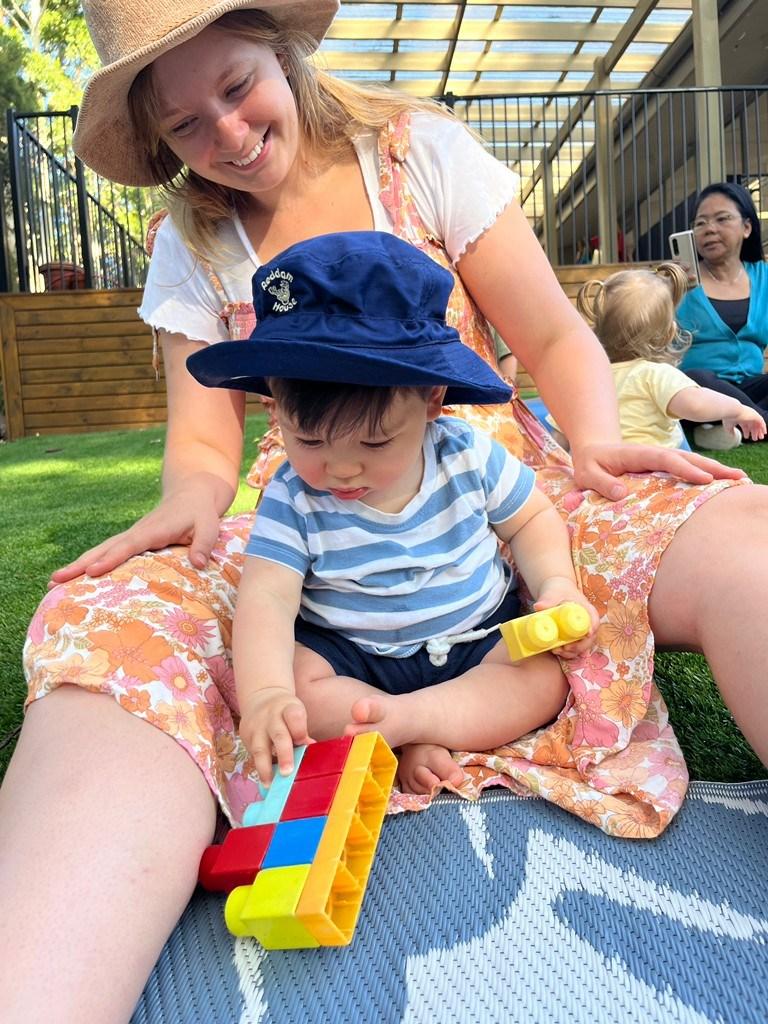





4
Stage 1R:

5
By Hazel Whybrow
This week we continued exploring the children’s interest in transport. A variety of experiences have been set up in our classroom for the children to explore vehicles. The children have been busy exploring all the different vehicles they could find. As they did so we named each vehicle, found out what colour it was and made the noise it makes. "Brmmmm" said Louis as he turned the wheels of the white truck, "Helicopter!" said Isabelle excitedly, "Beep beep" said Florence holding the yellow bus.

The children enjoyed exploring the sand trays in our classroom which have been filled with diggers and natural materials. Throughout the week we also ventured out to the sandpit. The children enjoyed exploring the large diggers and excitedly pointed them out to us. Some of them pushed the diggers around saying, "brmmmm". Throughout the week we noticed many large trucks driving past our playground to the building site at the end of the road. On Wednesday we saw a concrete mixer! We watched in amazement as it drove past us, and then turned around and reversed into the building site. We talked about what a concrete mixer does, and listened to the sounds it made. We then watched a video and a song all about concrete mixers to further our understanding.
Thank you all for a great week,
Stage 1E
6
The 1E team
Stage 1E:







7
Stage 1E:

8
Stage 2R
By Vivian Truong
This week 2R had the opportunity to discover their beautiful 'self'. Self-knowledge makes us independent of the opinions of others. Independence and self-awareness are also linked to confidence. Knowing who we are and what we stand for in life can help us gain a strong sense of self-confidence. In order to be ourselves, we have to know ourselves. As children play, learn and try new things, they develop an understanding of their own identity.
We invited our little ones to look at themselves in the mirror and use playdough and loose parts to create faces. This experience encouraged the children to take a closer look at their facial features and see their reflections. Teachers compared children’s facial features to their peers pointing out their similarities and differences. This experience was a way to nurture their developing self-awareness, which is a key part of their overall social-emotional development.

More experiences involved the children creating faces using circular boards with mirrors and a range of loose parts. This experience allowed the children to express their creativity through the use of loose parts allowing for greater detail in their creations. 2R's little artists explored their surroundings with fingers, hands and paint and made some unique creations. This hands-on discovery involved all major senses – visual, auditory, kinesthetic – thereby improving the sensory abilities of children and providing them unparalleled freedom of selfexpres
Learning experiences offered in 2R are self explanatory for children to explore each of the elements. The teachers are there to observe, ask or invite children to think about or explore an idea. Play that is initiated by children (with our little instruction), encourages new ideas and expands children's ability to explore and be in control of their learning. Our Reggio Emilia approach is an innovative and inspiring approach which values the child as strong, capable and resilient; rich with wonder and knowledge which will encourage their wonderment and knowledge in their actions by provoking thinking, ideas and creativity.
Wishing our families a lovely weekend,
Vivian, Connie, Fatima and Doris
9
Stage 2R:









10
Stage 2R:

11
By Mia Doan
“Children gain deep satisfactions and knowledge from following their own interests.” (Unknown)
Inresponsetothechildren’splayideas,thisweekfocusedonOurInterests.The 2E children’s favourite things were integrated into play-based activities and texts to scaffold their learning and knowledge. 2E children are able to restore and recollect information and prior experiences to connect with new learning and exploration. When 2E children experience learning programs that reflect their interests, it strongly promotes their sense of belonging and identity, motivates children’s interactions with others and builds on their prior knowledge. They came to school with full bags of knowledge and wanted to share this with peers who had similar interests.
Reading books related to 2E children’s interests inclusively boosts their confidence and extends their attention skills during group-time. They actively participated in the group-time by sharing their knowledge and facts related to fire engine and emergency services, dinosaurs, wild animals and construction vehicles. Integrating 2E children’s interests into shared-book reading experience and discussion paved the way for our children to raise their voices and created an enormous opportunity for children to find similarities between peers and learn from each other.
On the provocation table, the children were invited to engage in multiple sensory activities from red sand fire and emergency services, mix beans construction vehicles to building colourful blocks and cooking. In their play, they took on the roles of firefighters, construction workers or explorers and created imaginative play series. 2E children were excited to come to school everyday to see their interests were enriched and reflected on the provocation table.

Thank you for a wonderful week of learning and playing together!
Hope you have a fantastic weekend,
2E
Stage
12
Stage 2E:



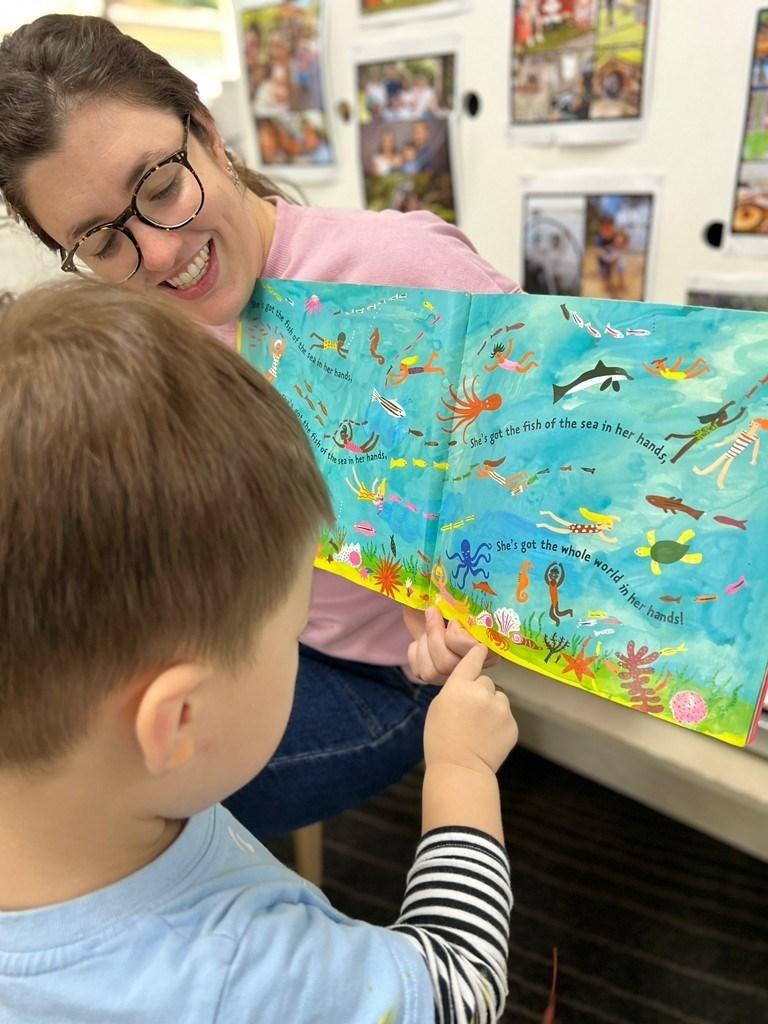



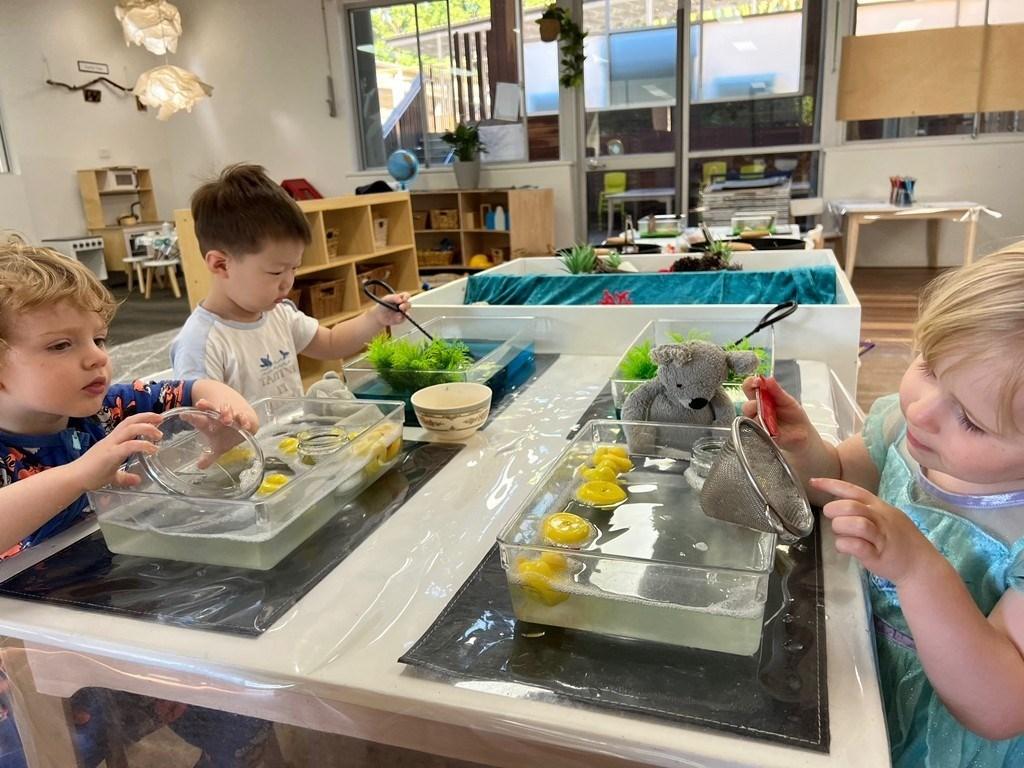
13

14
Stage 3R
By Grace Nolan
“Playtime engagement in physical activity is critical for children’s health and development… [and] has the ability to positively affect a child’s self-determination, which is attributable to increased motivation and sense of well-being in the individual”Watts, 2022
This week the children were invited to explore the classroom environment which featured aspects of the children's interests such as beach trays, sensory-water play, small dinosaur worlds, animal trays and dinosaur provocations at the writing centre.

Over the week the children demonstrated excitement in exploring these areas and experiences both with their peers, independently and with their educators. The more children are invited to visit and revisit experiences, the more understanding they are able to build upon and consolidate their understanding. The children are continually displaying their interest in water and dinosaurs as they use the table experiences and learning areas to extend into other aspects of play such as dramatic play both using figurines, in the home corner or the construction area.
In our small groups we focused on creating new, challenging and exciting obstacle courses for the children to attempt, practice and master fundamental movement skills such as hopping, balancing and throwing. The children were enthusiastic to join in and persist when challenged during the experiences. We were able to see the children use the obstacle course as a way to socialise as they hold their peers' hands to assist or shout words of encouragement when someone was taking their turn.
In the garden the children showed curiosity and strong feelings towards their natural environment. This led us to a small group experience where children were able to transfer soil from the bag into a container, plant seeds and water them. The children were able to identify the needs of plants - water, soil and sun. To extend this we will be recording the changes that we see in the plants and continue to plant different types of seeds.
Next week we continue to explore these projects.
Miss Grace, Miss Jenny and Miss Charity








16
Stage 3R:

17
Stage 3E
By Laura Ashcroft
“Our task is to help children communicate with the world using all their potential, strengths and languages, and to overcome any obstacle presented by our culture”. Loris

During Week 1, the children have started their exploration of using their senses and considering the different ways they can explore their surroundings by using their sense of touch. The children have enjoyed using their hands to feel and touch various textures found within the room, and being able to recognise and identify if it is rough, hard, soft, squish and soft. This has allowed them to use their verbal communication skills to convey their thoughts and ideas, as well as listen to each other's perspectives. The children have continued their exploration with different animals set up in their natural habitats, and were invited to feel and touch the pebbles, manipulate loose parts and pour and tip with water to and from different trays. This has allowed the children to use their emerging sensory capabilities to experiment and investigate with different materials and form their own relationships and connections within the play space.
The children engage in small table activities where they have been able to experiment with colour by using drippers to move paint around the paper and watch the colours overlap. They have enjoyed engaging in more constructive play where they build and manipulate different sized blocks together and adding further materials such as loose parts and mobilo. The children have proceeded to join in group discussions and morning meetings, where they repeat what the “Five L’s of Listening” looks like in our space, and how we become kind and respectful learners. The children have started to build upon their pre-literacy skills by singing into the room each morning and find their bag tag for their locker. This allows the children to develop their autonomy and independence, as they are able to confidently look after their belongings and take ownership of their learning and emerging interests.
Outside, the children have taken an interest in kicking soccer balls to each other and into a goal, balancing on the steppingstones, imaginative play and exploring with sticks, leaves, dirt and other natural materials.
We hope you all have a lovely weekend, Laura, Natalie & Kai
18
Malaguzzi
Stage 3E:

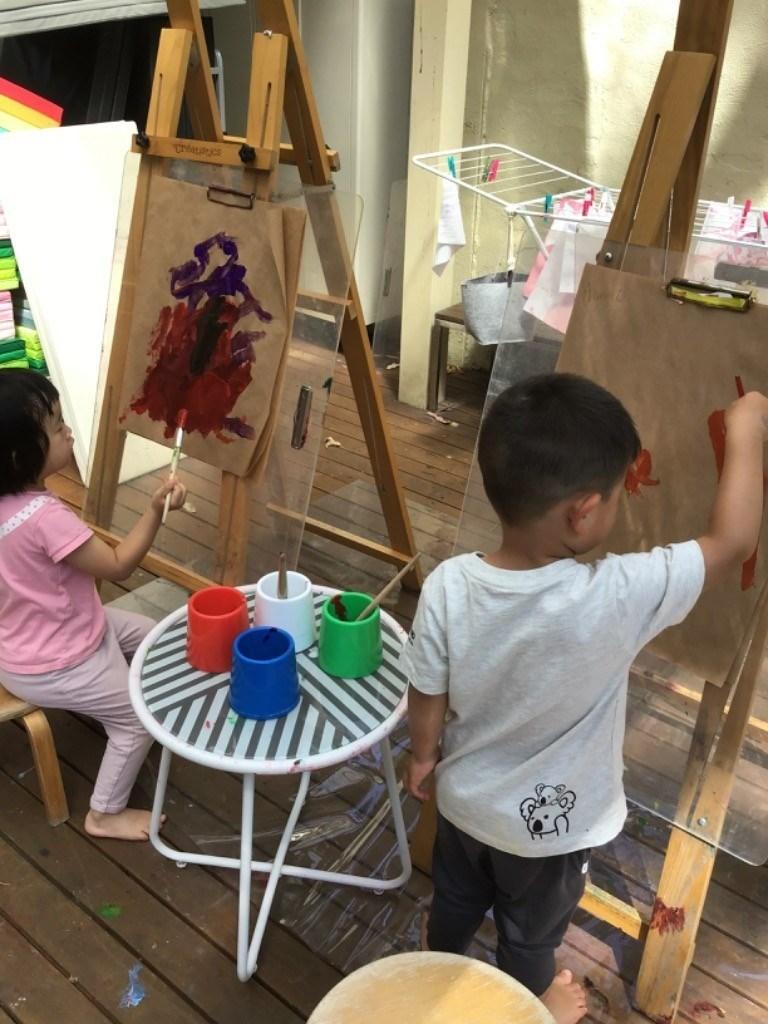







19
Stage 3E:

20
Stage 4R
By Amy Cunningham
Welcome back to our weekly newsletter update. At the beginning of the week, the children were still very engaged in exploring the Lunar New Year celebrations, especially during outside play. The children enjoyed using items from around the garden to make their drums and re-enact the “Legend of Nian” story they had listened to, banging pots and pans as they chased the monsters away! The children also utilised and built on their fine motor skills as many great drawings, paintings and collages of monsters kept appearing at different markmaking learning areas throughout the classroom.

Slowly, as the week went on, the children’s interests led us away from Luna New Year and into camping and travelling around the world. We’ve seen outstanding verbal and nonverbal communication skills as the children participated in cooperative role plays with their peers. We’ve made ‘campfires’ in our backyard firepit and enjoyed sitting on the wooden stumps surrounding the firepit to talk, share stories and cook some tasty food. Seeing the children’s imagination in full gear was a delight as they roasted delicious marshmallows or cooked pots of curries, stews and vegetable soups. These role-play opportunities are vital to a child’s social and cognitive development. Role-play scenarios build social skills, such as listening to others and turn-taking, encouraging empathy and understanding of others’ ideas and points of view, and allowing children to explore, investigate and experiment with the world around them.
Throughout the week, the children enjoyed getting crafty with various art mediums and techniques to make paintings and collage representations of drums, cars, pickup trucks and campfires. They’ve experimented with different sensory environments such as slime, clay and sand. We’ve been extending our gross motor skills by digging, scooping and pouring in the sandpit, climbing, balancing and jumping across the obstacle course, and strengthening our hand-eye coordination when throwing and catching balls during play ball with Miss Lauren.
We hope you have a lovely weekend ahead and look forward to seeing you all next week.
Warm wishes,
Amy, Callum and Margaret
21
Stage 4R:



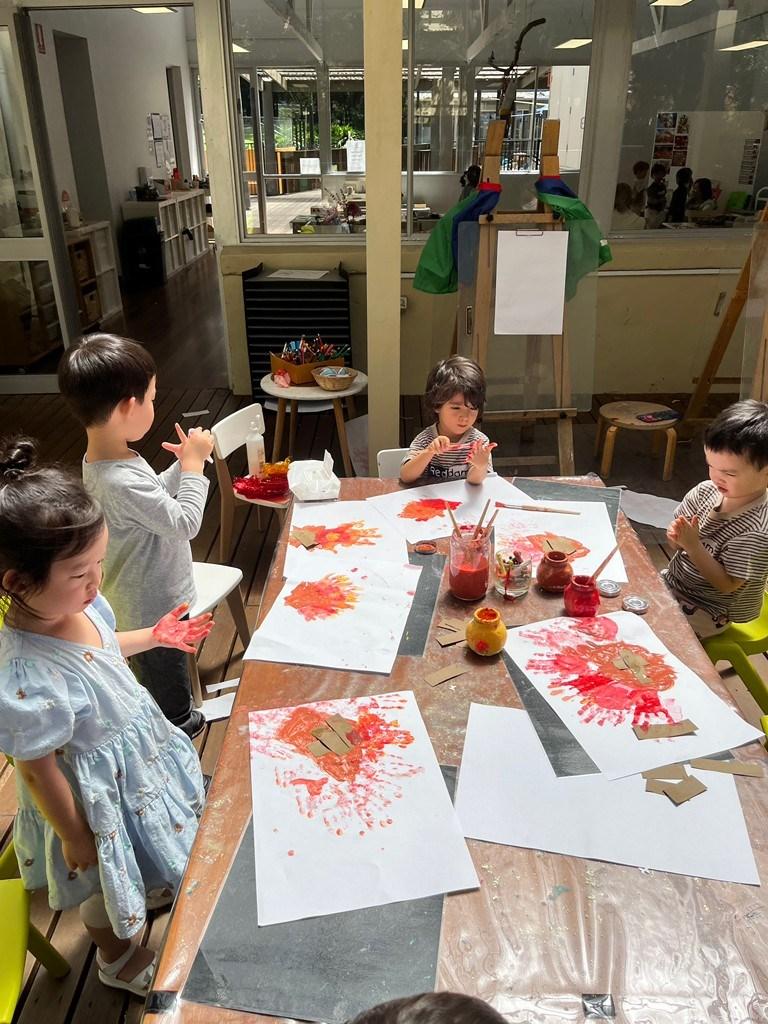
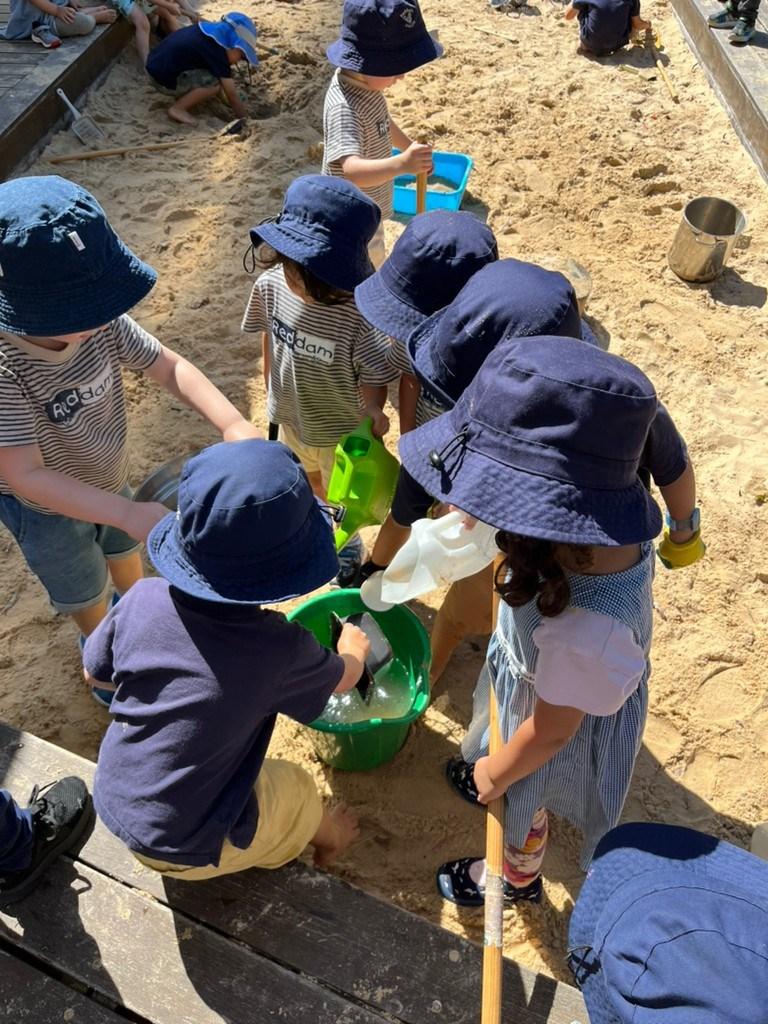
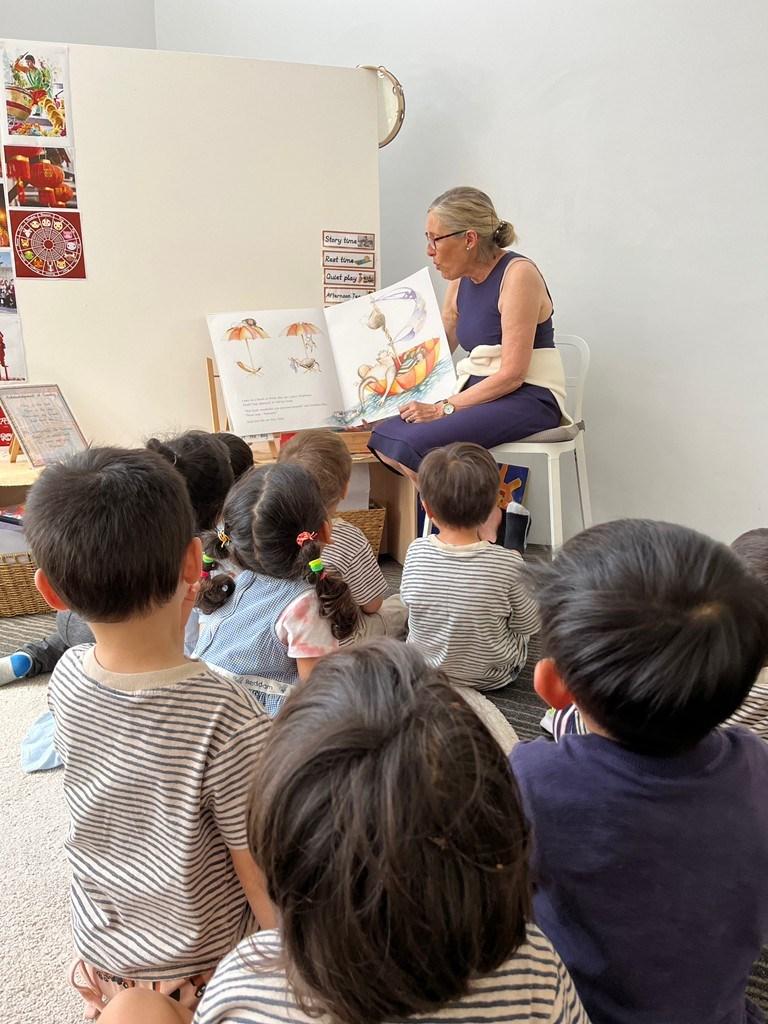


22
Stage 4R:

23
By Lauren Hall
Childhood is filled with natural wonder and curiosity. The learning environment must reflect a classroom and outdoor space that inspires a sense of wanting to investigate, to find out and explore. - Kathy
Walker
During our first few weeks together, the children demonstrated a keen interest in minibeasts and all things that are found in the garden. We have been exploring the life-cycles of various insects including the butterfly and ladybug, we learnt about frogs last week, and today we began our inquiry into why bees are so important. During our morning group time we discussed what we already know about bees.
"They get the nectar." - Seth
"They can make honey." - Alexander
"They sting us if we disturb them." - Marcus
"There's a queen bee." - Giselle
Our story of the week was called The Beeman by Laurie Krebs about a young boy who loved visiting his grandpa because he kept bees in his backyard. The book explained how beekeepers wear protective clothing, including gloves, to avoid being stung. The bees are kept in boxes called "shallows" and inside are frames where they create the honeycomb, made up of hexagonal-shaped holes.
We also learnt that bees have various jobs to do. The ‘queen bee’ is the largest female bee in the hive and the most important. All the other bees protect her and she is the only female that lays eggs in each honeycomb cell. The 'drone bees' are all male and their only job is to mate with the queen. The 'worker bees' are female and leave the hive to collect nectar from flowers whilst pollinating them. When they bring the nectar back to the hive, the ‘house bees’ turn it into a honeycomb which fills the frames in the shallows.
Our story then led to a question, "Why are bees so important?" We learnt how every time a bee lands on flowers to collect nectar, it pollinates them as it moves from one to the other. This ensures that the flower or plant will keep growing and multiply. We rely on bees to pollinate our fruit and vegetable plants too. Towards the end of the week, the children demonstrated their interest in growing plants. We first looked at how plants grow from seeds and noticed that many of them look different. The children were particularly interested in the sunflower seeds and were invited to plant their own seeds. We will observe how they sprout and grow throughout the term.
Next week we will continue with the children’s interest in flower pollination and start to replenish our vegetable garden. We hope to attract more bees and friendly insects to our garden by planting colourful flowers and herbs.
Lauren, Rowel and Rebecca
24
Stage 4E









25
Stage 4E:
Stage 4E:

26




















































































